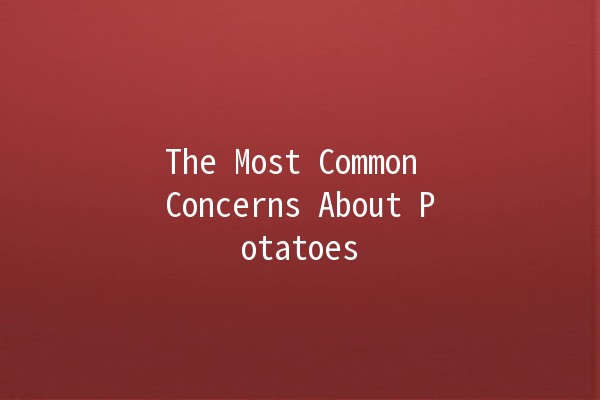Potatoes have been a staple food across the globe for centuries. Moreover, they are incredibly versatile and can be used in various cuisines. However, many people still have questions about this humble vegetable. This article aims to address the most frequent concerns surrounding potatoes, offering practical advice, useful tips, and insights into their cultivation and usage.
Potatoes have often been misclassified as unhealthy due to their high carbohydrate content. However, when consumed in moderation and in their whole form, they can be part of a balanced diet.
Nutritional Benefits of Potatoes
Potatoes are rich in vitamins and minerals, including:
Vitamin C: Important for the immune system and skin health.
B Vitamins: Essential for energy metabolism.

Potassium: Aids in heart health and muscle function.
Fiber: Promotes digestive health.
Practical Application: Eating Potatoes Healthily
To maximize the nutritional benefits of potatoes, consider the following tips:
Opt for Baking or Boiling: Instead of frying, try baking or boiling your potatoes. This method retains more nutrients and reduces unwanted fats.
Leave the Skin On: Much of the fiber and nutrients are found in the skin, so washing and leaving it on for meals is advisable.
Pair with NutrientDense Foods: Combine potatoes with lean proteins and vegetables for a balanced meal.
The proper storage of potatoes can significantly extend their shelf life and maintain quality.
Best Practices for Storing Potatoes
Keep Them in a Cool, Dark Place: Potatoes should be stored in a location that is dark and cool but not too cold. Ideal temperatures range from 45°F to 50°F (7°C to 10°C).
Avoid Refrigeration: While it may seem practical, refrigerating potatoes can lead to a sweet, offflavor due to the conversion of starch to sugar.
Store in Paper Bags: Paper bags are advisable as they allow the potatoes to breathe without trapping moisture that could lead to rot.
Practical Application: Maintaining Potato Quality
To prevent sprouting and spoilage, regularly check your stored potatoes and remove any that show signs of decay. This practice can help preserve the others for a longer period.
A common myth is that eating potatoes leads to weight gain. The truth is that it depends on how potatoes are prepared and served.
Understanding Potatoes and Weight
Controlled Portions: Eating potatoes in moderation does not lead to weight gain. It's when they are served in large portions or accompanied by highcalorie toppings (like butter or cream) that problems arise.
The Glycemic Index (GI): Potatoes have varying GI scores depending on their type and preparation method. For instance, boiled potatoes have a lower GI than French fries.
Practical Application: Healthy Portion Control
To keep your potato intake in check while maintaining satisfaction, consider:
Using Smaller Plates: Serving smaller portions can help control calorie intake.
Incorporating Potatoes into Balanced Meals: Pair them with proteins and vegetables to create fulfilling portions without excess calories.
Understanding the various types of potatoes helps in selecting the right one for different dishes.
Common Types of Potatoes
Russet Potatoes: Ideal for baking and mashing due to their high starch content.
Yukon Gold Potatoes: Great for roasting and sautéing, with a creamy texture and slight buttery flavor.
New Potatoes: Less mature, often waxy, and best in salads or steamed dishes.
Red Potatoes: Good for roasting and salads due to their firm texture.
Practical Application: Choosing the Right Potato
Always consider the intended cooking method when selecting potatoes. For instance, if you're preparing mashed potatoes, opt for Russets for the best texture and flavor.
Potatoes are often seen as a blank canvas in the culinary world. However, enhancing their flavor can elevate a dish.
Enhancing Potatoes' Flavor
Season Well: Salt, pepper, garlic, and herbs can greatly improve the flavor of potatoes.
Use Healthy Fats: Olive oil or avocado oil adds richness and keeps the dish healthy.
Experiment with Toppings: Ingredients like Greek yogurt, chives, or cheese can enhance taste without being overly indulgent.
Practical Application: Flavors for Different Dishes
For a great baked potato, consider toppings like Greek yogurt, mixed herbs, or roasted garlic to add depth without excess calories or unhealthy fats.
FAQs About Potatoes
Yes, potatoes are naturally glutenfree. They are an excellent option for those with gluten intolerance or celiac disease.
Green potatoes indicate exposure to light and may contain solanine, a toxic compound. It's best to avoid eating green parts or storing them in light.
Typically, it takes 1520 minutes to boil potatoes, depending on their size. They are done when you can easily pierce them with a fork.
You can freeze potatoes, but it's best to blanch them first to maintain texture and color upon thawing.
If potatoes sprout, they are still safe to eat but should be cooked after removing the sprouts. Consider using them up before this happens.
Signs that a potato has gone bad include a soft or mushy texture, a strong odor, or visible mold. If in doubt, it's best to err on the side of caution and discard it.
By maintaining proper storage, understanding nutritional benefits, and knowing how to prepare and enhance the flavor of potatoes, you can enjoy this versatile vegetable while reaping its many benefits. Make informed choices and get the most out of your potato dishes!